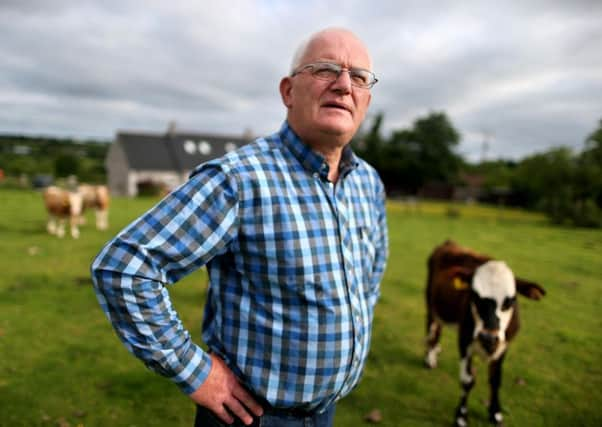How major Drumcree talks offer was made '“ and kept secret


Speaking to his deputy, Nigel Dawson, on the journey, the Portadown district grand master said that “we do something radical” and suggested writing to the residents asking for talks.
When Mr Dawson asked who would chair the talks and where they would be held, Mr Hewitt said that he “hadn’t a clue” at that stage.
Advertisement
Hide AdAdvertisement
Hide AdHowever, he said that he then recalled a senior Roman Catholic priest whom he had recently met – ironically through the Orange Order.
The following month, he phoned the priest on his mobile phone and asked him if he could “suggest somewhere within the Roman Catholic Church that would be suitable for talks. His immediate response was ‘No problem, I can think of three or four places off the top of my head’.
“It was only then, because his response was so immediate and so positive, that I said ‘Tell me this, would you be prepared to chair the talks?’
“His response was: ‘Darryl, I would not only be delighted, I would be honoured. But I would need to speak to two or three people - my own diocesan bishop, Cardinal Brady and the parish priest in Portadown’.”
Advertisement
Hide AdAdvertisement
Hide AdThe News Letter is aware of the identity of the senior priest but Mr Hewitt has asked us not to publish the cleric’s name.
The priest had proposed Dromantine, a church-run retreat centre about 10 miles from the border in South Armagh as a suitable venue for the talks.
Mr Hewitt then wrote to Joe Duffy, who along with Breandan Mac Cionnaith heads up the Garvaghy Road Residents’ Coalition, proposing that “in order to seek a long term resolution to the Drumcree/Garvaghy Road impasse, I, on behalf of Portadown District, have approached a senior member of the Roman Catholic clergy. The senior cleric has indicated his willingness to provide a neutral venue and chair talks between ourselves on the outstanding issues”.
In polite correspondence seen by the News Letter, Mr Duffy responded immediately, enquiring as to the identity of the priest “in order to fully discuss the contents of your letter with other residents”.
Advertisement
Hide AdAdvertisement
Hide AdMr Hewitt replied with a holding letter six days later to say that he was waiting for permission from the priest, which subsequently was followed by a letter two weeks later in which he passed on the name and mobile phone number of the cleric.
In it, he said: “I do sincerely hope that your group will agree to meet Portadown District under the chairmanship of [the cleric] and look forward to a favourable response to this letter.”
Mr Hewitt told the News Letter: “I then heard nothing more for months.”
Eventually, he contacted the priest who said that he had met with the residents.
Advertisement
Hide AdAdvertisement
Hide AdMr Hewitt said: “He didn’t tell me the contents of the meeting for obvious reasons and I didn’t really ask him. But he said to me ‘I have got a new job in the diocese so I’m going to have to stand down from being the chair of the talks’.”
Mr Hewitt said that the priest suggested that the Church of Ireland primate be approached to provide a co-chair for the prospective talks. Mr Hewitt met Church of Ireland primate Archbishop Richard Clarke, who agreed to the proposal.
Mr Hewitt then led an Orange delegation to have evening tea with the Catholic Primate, Archbishop Eamon Martin, just over a year ago, where he agreed to appoint a joint chair if the residents would agree to such a process.
Mr Hewitt then wrote to the residents last May, setting out the agreement of both primates to facilitate talks. Mr Duffy responded to acknowledge the correspondence and said: “We will respond to your letter in due course”.
Advertisement
Hide AdAdvertisement
Hide AdMr Hewitt said that although he had written again at the end of last year, “due course hasn’t arrived yet” and there has been no response.
However, the Portadown district master said that he had been left “totally flabbergasted” after he met Parades Commission chair Anne Henderson last May.
At that meeting, Mr Hewitt said that after he had outlined his attempts to enter dialogue with the residents “she looked me straight in the eye, shrugged her shoulders and said ‘and what do you want me to do about it?’ I said ‘I need you to encourage the residents to get involved in talks’.”
Mr Hewitt said that Ms Henderson had said that it was “not my remit” to press the residents to engage in dialogue.
Advertisement
Hide AdAdvertisement
Hide AdHe again met the Parades Commission on Tuesday night, but said that its response had been similarly dismissive of the Order’s attempts at talks.
The language used by one member of the commission at that meeting left Mr Hewitt “raging”, he said.
“I doubt there would be many people in Northern Ireland would expect the district master of any district – and in particular Portadown District – to invite a senior Roman Catholic cleric to chair talks, and that we would be happy to go to a Roman Catholic venue to hold the talks.”
A spokesperson for the Parades Commission said: “The divisive legacy of the Drumcree parading dispute is well understood by everyone involved. Information provided to the Commission, including an independent report in 2014, has highlighted the extent of these divisions and found that the dispute is for many communities linked to a number of traumatic events during the Troubles.
Advertisement
Hide AdAdvertisement
Hide Ad“The Commission continues to keep under review all aspects of the dispute, including maintaining contact with a wide range of stakeholders. The Commission has consistently encouraged all parties to agree an agenda for dialogue.”